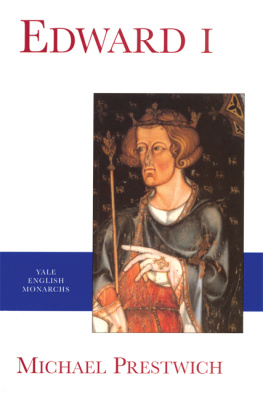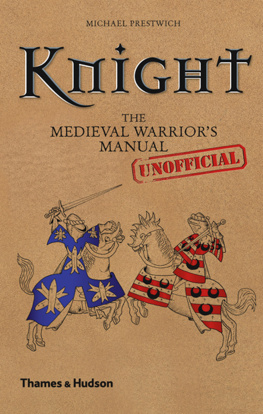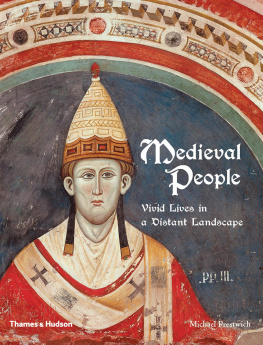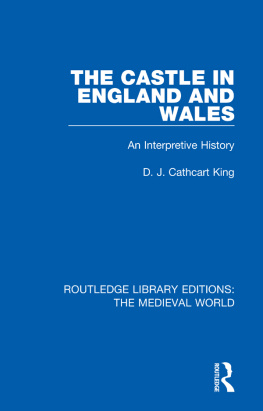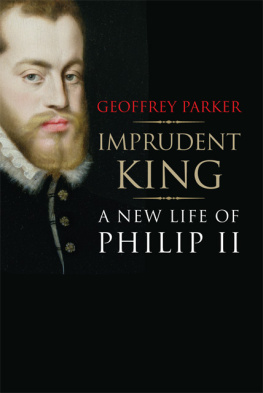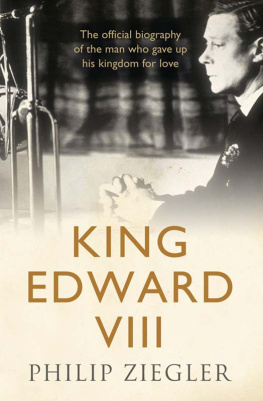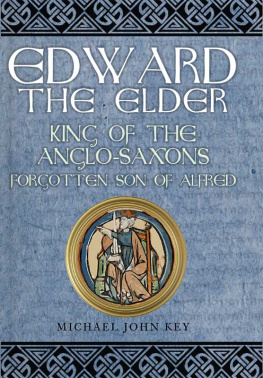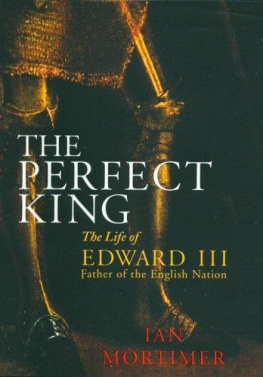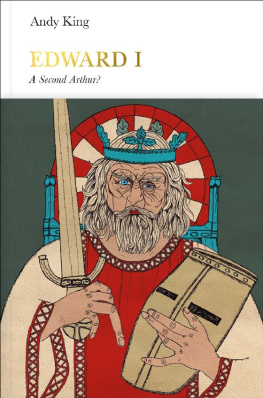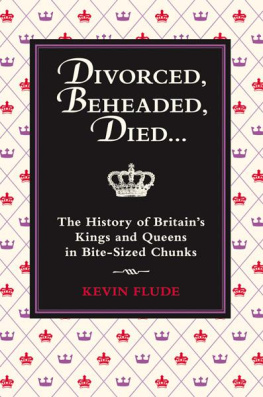
Also in the Yale English Monarchs Series
ATHELSTAN by Sarah Foot
EDWARD THE CONFESSOR by Frank Barlow
WILLIAM THE CONQUEROR by David Douglas
WILLIAM RUFUS by Frank Barlow
HENRY I by Warren Hollister
KING STEPHEN by Edmund King
HENRY II by W. L. Warren*
RICHARD I by John Gillingham
KING JOHN by W. L. Warren*
EDWARD I by Michael Prestwich
EDWARD II by Seymour Phillips
RICHARD II by Nigel Saul
HENRY V by Christopher Allmand
HENRY VI by Bertram Wolffe
EDWARD IV by Charles Ross
RICHARD III by Charles Ross
HENRY VII by S. B. Chrimes
HENRY VIII by J. J. Scarisbrick
EDWARD VI by Jennifer Loach
MARY I by John Edwards
JAMES II by John Miller
QUEEN ANNE by Edward Gregg
GEORGE I by Ragnhild Hatton
GEORGE II by Andrew C. Thompson
GEORGE III by Jeremy Black
GEORGE IV by E. A. Smith
Available in the U.S. from University of California Press

First published in Great Britain in 1988 by Methuen London Ltd
First published in paperback in 1990 by Methuen London
This edition first published by Yale University Press in 1997
Copyright 1988 Michael Prestwich
New edition 1997 Michael Prestwich
All rights reserved. This book may not be reproduced in whole or in part, in any form (beyond that copying permitted by Sections 107 and 108 of the U.S. Copyright Law and except by reviewers for the public press), without written permission from the publishers.
Printed in Great Britain by St Edmundsbury Press Ltd
Library of Congress Catalog Card Number 97-60218
ISBN 0-300-07209-0 (hbk.)
ISBN 978-0-300-07157-3 (pbk.)
A catalogue record for this book is available from the British Library.
5 7 9 10 8 6 4
For Robin, Chris and Kate
CONTENTS
LIST OF ILLUSTRATIONS
MAPS AND PLANS
GENEALOGICAL TABLES
The maps, plans and genealogical tables were redrawn from the author's roughs by Neil Hyslop.
FOREWORD TO THE YALE EDITION
The difficulties of writing a biography of a medieval ruler are many, and I faced some particular problems in the case of Edward I. One was the weight of earlier scholarship, most notably the achievement of F.M. Powicke, whose powerful and sympathetic vision of the king was hard to avoid. The bulk of surviving evidence was another; medieval England was a precociously bureaucratic country, and in addition to the very substantial amount of printed material available to historians, there is even today a great quantity of unpublished records. Yet the quantity of evidence is not all in the right area for the biographer. The personality of Edward himself is often obscured rather than illuminated by the labours of the clerks of chancery and exchequer. Specific details from the household accounts about the king's personal tastes may help to provide something of the flavour of the period, but can reveal nothing of his thoughts.
At the time that I wrote this book, Edward's reputation among historians had reached a cyclic low. Work on the king's relationship with his earls had suggested that his dealings lacked integrity to an unacceptable degree, being marked by cynical manipulations of the law. Nor were they determined by any clear strategic vision. Work on the history of Wales and Scotland had inevitably yielded a hostile interpretation of Edward, whose claims to lordship were seen as harsh, overbearing and unjustified.
I did not embark on this book with any deliberate attempt to reverse what was becoming a historical orthodoxy. I was anxious to avoid, as far as possible, the application of the moral standards of a very different age to Edward's reign. My aim was to try to reassess the king in the light of the contemporary evidence; this may have resulted, in some instances, in my adopting a more favourable view of some of his actions than I had done in the past. He gained the benefit of the doubt. More significantly, a pragmatic approach such as this carries with it the danger of ignoring longer-term developments, and of reducing the influence of theoretical ideas on political developments. My belief, however, is that Edward was essentially an opportunist, and that his actions and policies are best explained in terms of their immediate circumstances. On the other hand there is no doubt that he was throughout imbued with a fierce determination to preserve, protect and enhance his rights as king.
This new foreword provides me with a welcome opportunity to draw attention to the way in which work on the period has developed since the book first appeared. I did not intend this to be a definitive study; it would be far more pleasing to have opened up new avenues for research, but the extent to which that has happened has been limited. Important work on the reign has appeared since it was first published, but no radically new interpretation of Edward himself has been set out, though in a number of areas the picture that I provided has been filled out, given a different shading, or lit from a different angle. I should add that it was not my intention in writing this book to provide an histoire totale, and to examine the social, economic and intellectual history of England in Edward's lifetime. Equally, therefore, this foreword does not extend to a discussion of the important recent work that has been done in these fields.
The period of Edward's youth has been illuminated by John Maddicott's fine study of the future king's uncle, Simon de Montfort.
There has been little further biographical study of the great figures of Edward's reign, despite the growing popularity of such approaches. The one notable exception is his first queen, Eleanor of Castile, who is the subject of a fine book by John C. Parsons. This provides a picture of sophisticated surroundings and considerable luxury, and it is clear that the queen's upbringing in the highly literary ambience of the Castilian court meant that she brought with her to England intellectual interests which surely exceeded those of her husband. Eleanor remains, however, an ambivalent figure, with the harsh management of her estates contrasting with the traditional image of the queen.
Scott L. Waugh's work on wardship in the thirteenth century appeared at about the same time as the original edition of this book; it contains much that is relevant to a reassessment of the king's policies. To give a specific example, the In more general terms Waugh has done much to illustrate the way in which royal patronage operated, and its legal framework.
The king's relationship with the church has been examined by J.H. Denton in a paper which takes the establishment of Vale Royal Abbey as its starting point.
R.R. Davies's monumental work on medieval Wales appeared just in time to be taken into account to a limited extent in the final revision of Edward I.
In general terms, there is no doubt that what Edward was attempting in both Wales and Scotland was to make effective his claims to overlordship, establishing their practical implications in a thorough-going fashion which proved unacceptable in both countries.
There has been interest recently in military history, but concentration has been greater on the eleventh and twelfth centuries, and on the Hundred Years War, than on Edward I's reign. Indeed, in discussions of whether there was a medieval military revolution, Edward's reign has received very little emphasis. The dismounting of men-at-arms and the use of mounted archers are seen as the vital tactical innovations which led to the great English triumphs at Crcy and Poitiers, and these had their origins in the Anglo-Scottish wars following the English defeat at Bannockburn in 1314. There is, however, still a case to be made for the importance of Edward I's achievement in mobilising men, equipment and victuals on an unprecedented scale. His reign witnessed a revolution in the quantity if not the quality of English armies.
Next page
